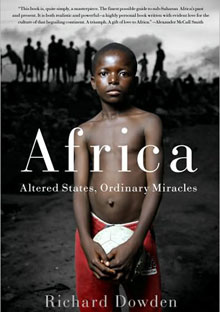The African Paradox
War, Famine, Genocide—Joy.

Africa: Altered States, Ordinary Miracles
By Richard Dowden
592 pages; Public Affairs
"In Zulu there is a saying: 'One is a person through others,' or, as John Mbiti, the Kenyan theologian, put it: 'I am because we are and, since we are, therefore I am." This communalism, Africa correspondent Richard Dowden theorizes in Africa: Altered States, Ordinary Miracles, a comprehensive contemporary history of sub-Saharan Africa, makes Africans and Westerners nearly incomprehensible to each other. It is also a partial answer to Africa's most insistent question: How can a continent so fluent in famine, genocide, and torture so consistently serve up irrepressible optimism and undying hope? From Idi Amin's monstrous buffoonery to Robert Mugabe's path from prison to tyrannical rule in Zimbabwe, from Sudan's endless bloodshed in the name of water to the unthinkable horrors in Rwanda—"like an explosion so close that it numbs the brain"—Dowden has dedicated his life not to investigating but to knowing Africa, her history of tribal violence and misguided colonization as well as the "perfectly balanced" paradox her people live by: "Terrible times produce huge strength. Grief enhances joy. Death invigorates living."
In the mid-1990s, 31 of Africa's 53 countries were ravaged by civil war or serious civil unrest, yet there is no word for depression in most African languages. "Africa lives with death and suffering and grief every day, but to be alive is to talk and laugh, eat and drink—and dance," Dowden writes in this deeply informed and informative "tough love" love letter to a continent.



